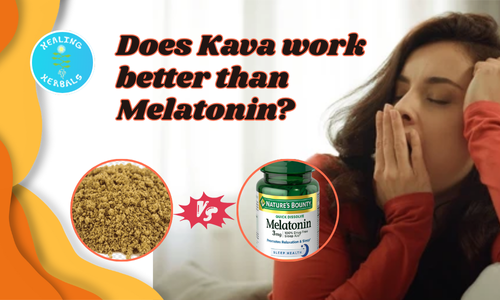
Kava for Sleep: Does It Work Better Than Melatonin?
Share
Sleep is one of the most crucial foundations of overall health, yet millions of people struggle to fall asleep or stay asleep each night. While melatonin supplements have long been the go-to natural remedy for sleeplessness, many are now turning to kava for sleep as a calming alternative. But how does kava compare to melatonin, and could it actually work better as a bedtime drink?
What Is Kava?
Kava (Piper methysticum) is a traditional South Pacific root known for its calming and anxiolytic effects. Traditionally consumed as a tea-like drink during ceremonies, kava is now popular in kava bars and wellness spaces for its ability to relieve stress, ease anxiety, and promote restful sleep.
Its active compounds, kavalactones, interact with the brain’s GABA receptors—similar to how anti-anxiety medications work—helping the mind and body relax naturally.
How Melatonin Works
Unlike kava, melatonin is a hormone your body naturally produces in response to darkness. Supplemental melatonin is widely used to reset sleep cycles—especially for jet lag or shift work.
However, melatonin doesn’t necessarily calm the mind or body. Instead, it simply signals your system that it’s time to sleep, which means it may not be effective for those whose insomnia is caused by stress or anxiety.
Kava vs. Melatonin: Key Differences
| Factor | Kava for Sleep | Melatonin |
|---|---|---|
| How It Works | Calms the nervous system, reduces anxiety, promotes relaxation | Regulates circadian rhythm, signals the body it’s time to sleep |
| Best For | Stress-induced insomnia, anxious thoughts before bed | Jet lag, irregular sleep schedules |
| Onset | Works within 20–40 minutes | Works within 30–60 minutes |
| Side Effects | Mild drowsiness, heavy relaxation (in higher doses) | Grogginess, vivid dreams, hormonal disruption (if overused) |
Kava as a Bedtime Drink
Many people now enjoy kava bedtime drinks instead of alcohol or sleep pills. Whether consumed as a warm tea, tincture, or instant mix, kava helps:
- Quiet racing thoughts
- Reduce tension and restlessness
- Ease the transition into natural sleep
Some users even report deeper and more restorative sleep compared to melatonin alone.
Should You Replace Melatonin with Kava?
The choice between kava vs. melatonin depends on the root cause of your sleep issues:
- If you have jet lag or your sleep schedule is misaligned → melatonin may be more effective.
- If stress, anxiety, or overthinking keeps you awake → kava may provide better relief.
Many wellness enthusiasts even combine the two—using melatonin occasionally while making kava a nightly ritual.
If you’re tired of restless nights, trying kava for sleep may offer a natural and relaxing solution. Unlike melatonin, which simply adjusts your body clock, kava actively calms the nervous system and prepares your mind for rest.
For those seeking a soothing bedtime drink, kava may be the herbal sleep aid you’ve been looking for.
